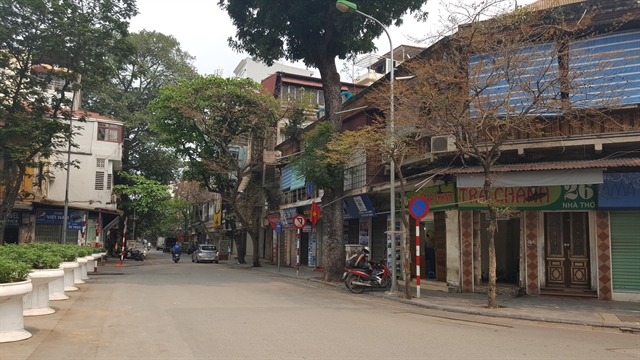The report was conducted by UNDP, UNWomen and the Centre for Analysis and Forecast (CAF) under the Việt Nam Academy of Social Sciences (VASS) by surveying more than 900 vulnerable households and 900 vulnerable household businesses and MSMEs in 58 out of 63 provinces.

The COVID-19 pandemic has substantially reduced revenue for both household businesses (HBs) and micro, small and medium enterprises (MSMEs), according to the report 'COVID-19 Socio-economic Impact on Vulnerable Households and Enterprises in Viet Nam'.
The report was conducted by UNDP, UNWomen and the Centre for Analysis and Forecast (CAF) under the Viet Nam Academy of Social Sciences (VASS) by surveying more than 900 vulnerable households and 900 vulnerable household businesses and MSMEs in 58 out of 63 provinces.
Its key findings were presented in Ha Noi on Thursday at a workshop alongside the report 'Impacts on key economic indicators, external factors and recovery perspectives' by the National Centre for Information and Forecast (NCIF) under the Ministry of Planning and Investment (MPI).
According to the report, difficulties due to COVID-19 forced most MSMEs to cut their business operations and reduce their numbers of workers due to the serious decrease in output demand and supply disruptions.
The surveyed HBs and MSMEs suffered a sharp reduction of revenues as COVID-19 caused a scaling-down of their business activities. In comparison to December last year, MSMEs suffered a 78 per cent reduction in revenue, while HBs faced a decrease of 83 per cent.
Enterprise revenue in April this year as a proportion of December 2019 income was lowest (13 per cent) among MSMEs in the tourism and related services such as hotels, restaurants, and amongst HBs in the garment manufacturing and footwear sector. HBs in the tourism sector and related services recorded an 84 per cent reduction in April revenue.
Therefore, most MSMEs cut business operations by reducing the number of workers.
At the peak of the pandemic, 23.8 per cent of MSMEs reported a workforce reduction in April and May by more than 50 per cent of the December 2019 level.
The revenue decline of surveyed enterprises eased in May. A partial recovery of revenues was recorded for all types of firms, as evidenced by smaller revenue reduction in May than in April. Revenue in May of MSMEs and HBs, as compared to April, was 35 per cent and 20 per cent respectively.
However, in May MSMEs reported higher-level revenue compared to April, though the May revenues were still much lower than in December 2019.
HBs in tourism and related services recorded a further revenue reduction to 8 per cent of the December 2019 level.
The report recommended that the Government use public work programmes to provide immediate employment and income to the most vulnerable, including HBs and MSMEs.
The programmes could be organised by local government agencies that have a backlog of maintenance or small infrastructure work as well as environmental restoration that could be started and completed quickly.
The Government should also support enterprises to drive recovery and create alternative income-earning opportunities for workers in the informal sector.
Of which, it focuses on preventing lay-offs and bankruptcy of the otherwise healthy enterprises. An integrated set of policies could include deferment of tax and social and unemployment insurance and low-interest loans to pay workers’ salaries, support for reskilling, diversifying supply chains and markets and digitalising enterprise operations.
At the workshop, an NCIF representative said the COVID-19 pandemic had left an immediate, strong and negative impact on the global and Viet Nam’s economy, with the worst economic recession in decades.
The centre informed that the space for economic growth in the second half of the year would be considerably narrowed.
“As COVID-19 has affected many social and economic aspects and groups, ‘expanding the market’, ‘promoting investment’, and ‘stimulating consumption’ are the motivations for growth,” said NCIF President Luu Quang Khanh.
“It is crucial that in the long term, breakthrough solutions are needed for the new normal of the economy. In the short term, it is important to speed up of the policy implementation to stabilise the economy for further development,” he said.
Addressing the workshop, UNDP Resident Representative in Viet Nam Caitlin Wiesen said that: “The objective of the joint assessment is to inform the Government’s response and recovery to COVID-19.
"This is the first assessment that brings evidence of COVID-19 impact on vulnerable households and businesses, simulates the impact on poverty, and captures information on early recovery."
She stressed the importance of early, anticipatory, adaptive and agile actions of the Government combined with the innovation of the people as the key to the country’s initial success in containing the COVID-19 pandemic and limiting its negative impacts. — VNS





